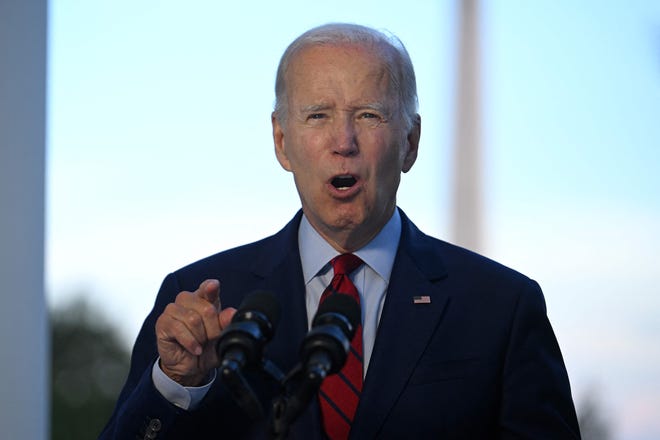
- Al-Zawahri was standing on a balcony of a house in downtown Kabul that was hit by two missiles.
- The U.S. says no others, including civilians, were killed in the attack.
- Al-Zawahri was the most senior leader of al-Qaida since 2011.
WASHINGTON — President Joe Biden said Monday that a U.S. drone strike in Afghanistan over the weekend killed top al-Qaida leader Ayman al-Zawahri, the successor of the terrorist network’s slain leader Osama bin Laden.
"Justice has been delivered and this terrorist leader is no more," the president said in a special address at the White House Monday evening.
The strike, which occurred at 9:38 p.m. ET Saturday night, is the first known U.S. attack in Afghanistan since Biden ended America’s 20-year war in Afghanistan last August.
Al-Zawahri, 71, was standing on a balcony of a “safe house” in downtown Kabul that was hit by two missiles, according to a senior administration official, who discussed the attack with reporters on the condition of anonymity.
More:Who is Ayman al-Zawahri? Master strategist for al-Qaida was Osama bin Laden's mentor, then successor
The strikes killed al-Zawahri – the most senior leader of al-Qaida since 2011 – and no one else, including civilians, the official said, citing U.S. intelligence. None of al-Zawahri’s family members were present.
Biden, speaking from a White House balcony as he recovers from a rebound case of COVID-19, called al-Zawahri "the mastermind" for decades of attacks against the U.S. He was bin Laden's top deputy during the 9/11 terrorist attacks in 2001 and helped carry out the 2000 bombing of the USS Cole and the 1998 bombings of U.S. embassies in Tanzania and Kenya.
“He carved a trail of murder and violence against American citizens, American servicemembers, American diplomats and American interests," Biden said. "People around the world no longer need to fear the vicious and determined killer."

The president hailed the mission as a "total success" and said it was carefully planned to minimize risks to civilians.
Biden and other officials were first briefed on al-Zawahri's location in April. The president learned of the proposed operation July 1 and signed off on it after a July 25 meeting with top advisers, the official said.
"After carefully considering clear and convincing evidence of his location, I authorized the precision strike that would remove him from the battlefield once and for all," Biden said.
Al-Zawahri’s death delivers a “significant blow to the group's ability to operate, including against the U.S. homeland,” the official said. Biden said al-Zawahri was continuing to provide strategic direction to the vast terrorist network and made videos calling for future attacks against the U.S.
For several years, the U.S. was aware of a network giving protection to al-Zawahri, according to the official. This year, the U.S. intelligence revealed that al-Zawahri’s wife, his daughter and her children had been relocated to a safe house in Kabul, where al-Zawahri himself was later identified.
"No matter how long it takes, no matter where you hide, if you are a threat to our people, the United States will find you and take you out," Biden said, adding that he hopes al-Zawahri's death can bring "one more measurer of closure" to family members of 9/11 victims.
Biden was vice president when the U.S. killed bin Laden in 2011 during the Obama administration. Saturday's drone strike came nearly one year after the U.S. withdrawal from Afghanistan, ending America's longest war that was launched in response to the 9/11 attacks. The Taliban regained control of Afghanistan in the midst of the U.S. exit last August.
Senior Taliban leaders were aware of Zawahri’s location, a U.S. official said.
More:With last plane out of Kabul, America's 20-year war in Afghanistan is over

Although he kept a low profile for most of the past 25 years, U.S. officials never gave up the hunt for Zawahri, an Egyptian physician and eye surgeon by training who started as bin Laden’s mentor when the two met in Afghanistan in the 1990s.
For years, the two worked hand-in-glove to build out al-Qaida’s global terrorist reach and capabilities, with bin Laden acting as the public face of the organization and Zawahri as a master strategist with a deep understanding of Islamic theology.
Zawahri was initially far more influential than bin Laden, serving as the leader of the Egyptian Islamic Jihad, the terror group responsible for the 1981 assassination of Egyptian President Anwar Sadat.
Zawahri also spoke much better English than bin Laden and over the years did a lot behind the scenes to unite and keep the together the various al-Qaida factions.
Sen. Joni Ernst, R-Iowa, a combat veteran who sits on the Armed Services Committee, hailed the announcement.
Al-Zawahri “has the blood of far too many U.S. servicemembers and innocent civilians on his hands,” she said.
But some longtime U.S. counterterrorism officials downplayed the significance of the strike, saying that al-Zawahri over the years had never really stepped into the void left behind after the U.S. killed bin Laden, al-Qaida's founder and the man who had united many terrorist groups under the al-Qaida banner in the late 1990s.
As a result, al-Qaida lacks the same top-down organizational structure that it did before bin Laden’s death more than a decade ago, with at least five affiliates around the world now operating largely independent of each other and the “core al-Qaida” elements still residing in Afghanistan, according to Javed Ali, a senior National Security Council counterterrorism official in the Trump administration who has tracked al-Zawahri and other al-Qaida leaders for decades.
“This is a continuation of the longstanding U.S. effort to decimate al-Qaida leadership over the last 20 years, and while al-Zawahri had taken over the reins a decade ago, he never held the same status as bin Laden. He was more of a caretaker, not a visionary,” said Ali, who also spent 16 years in top national security positions at the Defense Intelligence Agency, Department of Homeland Security and FBI.
It was al-Zawahri who wrote in a 1998 manifesto that killing Americans and their supporters anywhere in the world “is an individual duty for every Muslim who can do it in every country in which it is possible to do it.”
Three years later, he played a key role in helping bin Laden oversee the suicide hijackings, which were conceived of and orchestrated by a close Pakistani ally Khalid Sheikh Mohammed.
More:'I cannot pretend to be OK': Afghan refugees torn between new lives in US and haunting reality of home
Al-Zawahri’s role in 9/11 wasn’t highlighted as much as bin Laden’s and Mohammed’s by the 9/11 Commission and other investigative bodies. But his leadership of the strong contingent of Egyptians that had come to Afghanistan to join al-Qaida helped provide the operational skills, organizational know-how and financial expertise to carry out the attacks. Ringleader and lead hijacker of the 9/11 plot, Mohammed Atta, was a fellow Egyptian and so were many of the top commanders of the organization who had pledged allegiance to al-Zawahri.
Al-Zawahri was initially far more influential than bin Laden, serving as the leader of the Egyptian Islamic Jihad, the terror group responsible for the 1981 assassination of Egyptian President Anwar Sadat. “He was extremely influential,” Ali told USA TODAY. “He was a doctor, he was a thinker and he was 10 plus years old than bin Laden when they came together” in Afghanistan.
Rep. Adam Schiff, D-Calif, chairman of the House Intelligence Committee, said it's long been clear locating Zawahri was "one of the most challenging targets we faced."
He said the Taliban "will have to answer" for al-Zawahri’s presence in Kabul, noting they had assured the U.S. they would not give safe haven to al-Qaida terrorists.
Contributing: Tom Vanden Brook
Reach Joey Garrison on Twitter @joeygarrison.
Source link








